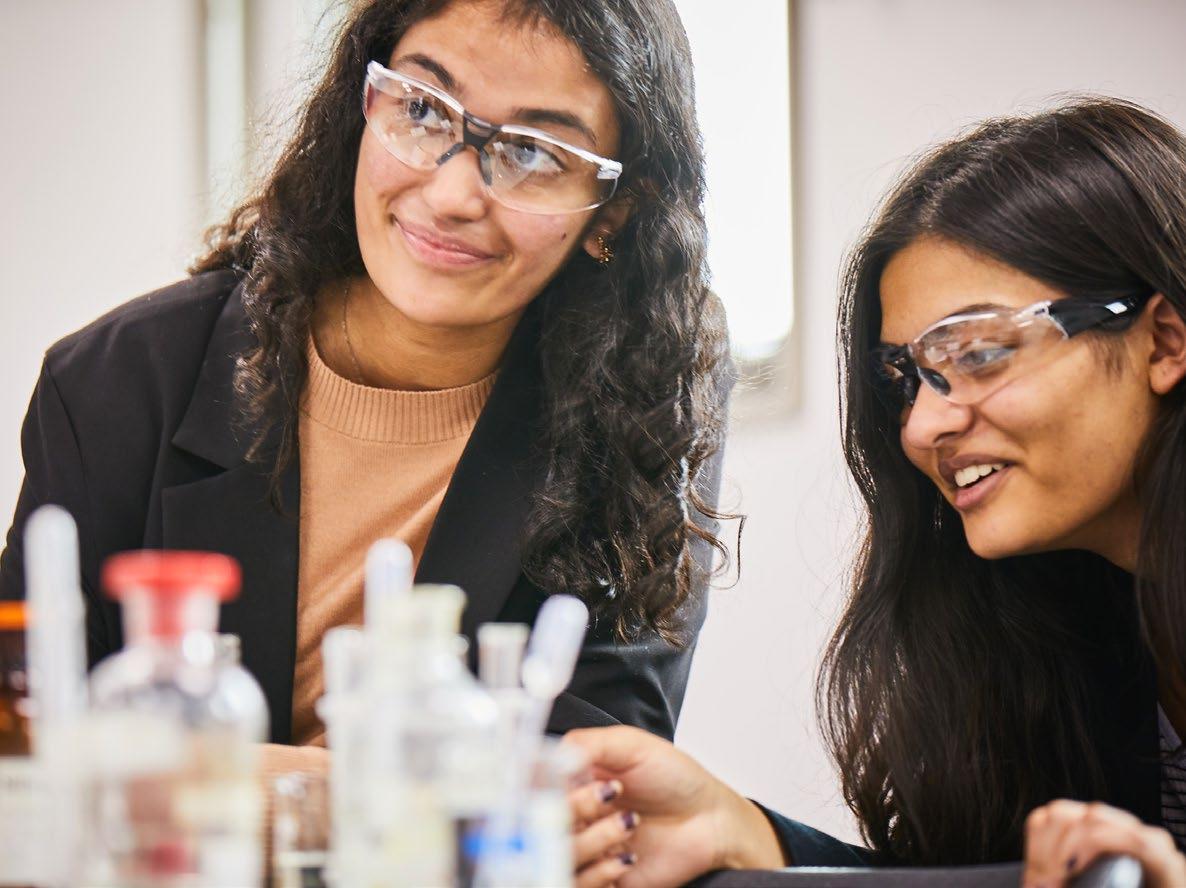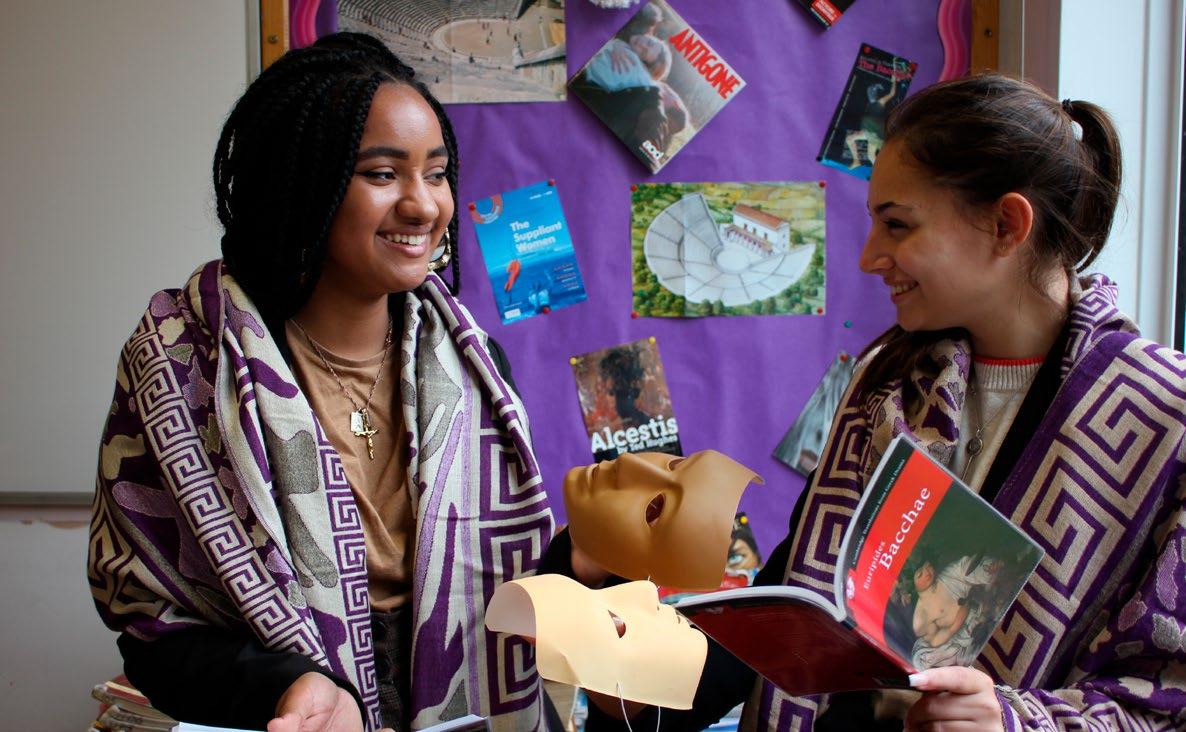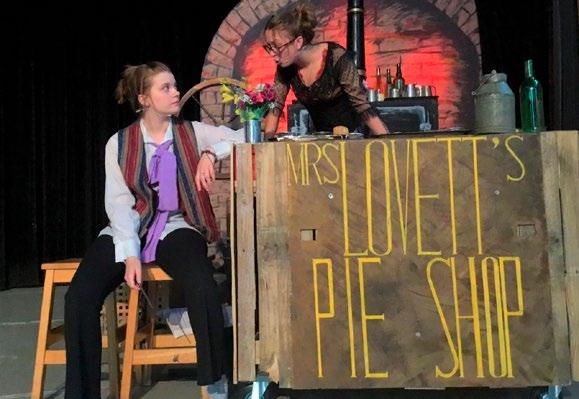
14 minute read
Extra-Curricular Opportunities
Biology
Specification: AQA Biology (7402) Head of Department: Dr R Smither
Advertisement
Introduction
Biology is the study of life in all its forms. If you want to learn how the body works, how we can cure disease, how organisms interact with each other or how every living organism is supremely adapted for life in its particular environment, then A-level Biology is for you. From the ecology of huge ecosystems to the biochemistry of tiny molecules within cells, Biology is a diverse subject that is relevant to many aspects of our everyday lives and has something in it for everyone. Alongside gaining factual knowledge, you will consider the ethical and moral implications of new developments in Biology, particularly in rapidly evolving and high profile fields such as gene technology. There are also plenty of opportunities for the development of practical skills and girls are expected to carry out a wide variety of experiments and investigations both in the laboratory and in the field. Good biologists are able to apply their subject knowledge to unfamiliar problems, are effective communicators, can analyse and evaluate scientific evidence and are able to think creatively. An A-level in Biology can help to open the door to many opportunities in life beyond MHSG. Overview of the course
The course is divided into eight topics. Topics 1 to 4 are studied in the Junior Sixth. Students then go on to study Units 5 to 8 in Senior Sixth to obtain their A-level in Biology. 1. Biological molecules 2. Cells
3. Organisms exchange substances with their environment 4. Genetic information, variation and relationships between organisms 5. Energy transfers in and between organisms 6. Organisms respond to changes in their internal and external environments
7. Genetics, populations, evolution and ecosystems 8. The control of gene expression
Practical work and the development of important mathematical skills are fully integrated into the A-level course. As they progress through the course, girls not only learn the relevant biological theory, but also learn important biological techniques and build on their generic skills so that by the end of the course they are able to plan, research, risk assess and implement an investigation. They also become competent at recording their observations, analysing their data and drawing relevant conclusions. There are 12 specific, compulsory practical activities required by the examination board that must be carried out, but there are plenty of additional practical opportunities throughout the course and through our extra-curricular programme. Extra-curricular opportunities
• Dissection club
• Writing for the Biovision newsletter • Talks by local biologists • Institute of Biology competitions • CREST Award
• Discussion group for students aspiring to be doctors, vets or dentists.
Assessments
Component 1 - Examination worth 35% of total A-level marks Features content from topics 1 to 4
Component 2 - Examination worth 35% of total A-level marks Features content from topics 5 to 8
Component 3 - Examination paper worth 30% of total A-level marks Features content from topics 1 to 8 Careers and higher education links
The skills and knowledge that are acquired through the study of Biology are highly transferrable, making Biology a very useful subject, regardless of your future career plans. Studying Biology at A-level is very helpful for anyone considering a career in medicine, dentistry, pharmacy, optometry, or another medical field, and many of our A-level students go on to study these subjects at university. Others choose to continue to study Biology at university, or are inspired to study disciplines that they heard about through studying A-level Biology, such as genetics, pathology, ecology or physiology. These degrees can open doors to a career in research science, health care, education, journalism, management or even something seemingly unrelated such as law or banking. An A-level in Biology is challenging, fun and could be your ticket to your ultimate career.

Chemistry
Specification: AQA Chemistry (7405) Head of Department: Mr A Guinan
Introduction
From the moment you are born and throughout your life you are surrounded by Chemistry: the air you breathe, the clothes you wear and the food you eat. Every material in existence is made up of matter; including our own bodies. Chemistry is the study of substances, what they are made of, how they interact, and the role they play in living things. Chemistry, known as the ‘central science’, helps to connect physical sciences such as Maths and Physics with applied sciences like Biology, medicine and engineering. By studying A-level Chemistry you will cover a range of topics using modern contexts such as materials science, green chemistry and drug development. As a practical subject, there are plenty of opportunities to develop research, problem solving and analytical skills. Chemistry can be a challenging subject but it is also very rewarding. An enquiring mind and a willingness to undertake independent study as well as being prepared to seek help when needed are all assets in the study of Chemistry.
Overview of the course
You will study the three branches of Chemistry for A-level Chemistry.
Physical Chemistry
You will study atomic structure, amount of substance, bonding, energetics, kinetics, chemical equilibria and Le Chatelier’s principle, oxidation, reduction and redox equations, thermodynamics, rate equations, equilibrium constant Kc and Kp, electrode potentials and electrochemical cells, acids and bases.
Inorganic Chemistry
You will study periodic trends, the properties of Group 2 & 7 elements, transition metal chemistry, and the reactions of ions in aqueous solution.
Organic Chemistry
In this section you will cover hydrocarbons, alcohols, aldehydes and ketones, carboxylic acids and derivatives, aromatic chemistry, amines, polymers, organic synthesis, and instrumental analytical techniques such as infra-red and nuclear magnetic resonance spectroscopy. Practical activities are a core component of the course, helping you to develop your practical skills as well as reinforcing your understanding of key chemical concepts. Over the course of the Junior Sixth academic year, you will complete six required practical activities and a further six practical activities during the Senior Sixth year.
Extra-curricular opportunities
• Advanced Chemistry discussions club • Cambridge Chemistry Challenge (J6) • Apply for a Headstart four-day residential course • Discover Chemistry Day at the University of Manchester • International Chemistry Olympiad (S6) • Schools’ Analyst competition (team competition) • Mentoring for Prep Science club
Assessments
Paper 1 - Examination worth 35% of total AS marks Physical and Inorganic Chemistry paper including relevant assessed practical questions.
Paper 2 - Examination worth 35% of total AS marks Physical and Organic Chemistry paper including relevant assessed practical questions.
Component 3 - Examination paper worth 30% of total A-level marks
Features multiple choice questions on content from all sections and structured questions on the required practical elements of the course. Careers and higher education links
Chemistry is a subject that can lead to a wide range of career options both in the chemical industry and many other fields. A degree in Chemistry can be used for any employment opening which requires applicants to be educated to degree level and is highly regarded, as students will have acquired practical, numerical and communication skills, as well as knowledge of a subject which requires problem-solving and logical thinking. Chemistry is also an essential subject for those who wish to study a variety of subjects at university; including medicine, dentistry, pharmacy, natural sciences, biochemistry, and biological studies. It is also beneficial to many areas of applied science such as chemical engineering, environmental sciences, food science, geology and materials science.
Classical Civilisation
Specification: OCR Advanced GCE in Classical Civilisation (H408) Head of Department: Miss J Welsby
Introduction
Classical Civilisation is an exciting, interesting and wideranging course which provides students with a broad, coherent and rewarding study of the literature and culture of the Classical world. The course embraces art, archaeology, history, literature, politics, philosophy and religion. You will have the opportunity to study some of the world’s most powerful literature and visual material, both of which have had a profound and wide-reaching influence on modern culture, giving you not only a depth and breadth of knowledge about the ancient world, but an insight into the modern world. Our culture has been and continues to be influenced and inspired by Classical models - from Greek tragedy to Shakespeare, from Greek comedy to satire and modern stand-up comedy, from the Parthenon to the Lincoln memorial.
Overview of the course
The A-level course is made up of three components:
Component 1: The World of the Hero
This is a compulsory component comprising an in-depth study of either Homer’s Iliad or Homer’s Odyssey and Virgil’s Aeneid.
Component 2: Culture and the Arts
Students study one component in this group, chosen from Greek Theatre or Imperial Image or Invention of the Barbarian or Greek Art.
Component 3: Beliefs and Ideas

Students study one component in this group, chosen from Greek Religion or Love and Relationships in the Greek and Roman world or Democracy and the Athenians. Year 12
You will study one element of Component 1 – Homer’s Odyssey. This epic poem is fundamental to the western literature and is the second oldest extant work of western literature. It focuses on the journey from Troy to his home in Ithaca of the Greek hero Odysseus. For Component 2 you will study three fascinating plays from the golden age of Greek drama – Bacchae, Oedipus the King and Frogs. Despite the fact that these plays were written approximately 2,500 years ago, they are still as relevant today as when they were written and provoke discussion about questions such as the importance of family, fate and politics.
Year 13
You will study the second element of Component 1 – Vergil’s Aeneid. The story of Aeneas who escaped the fall of Troy and journeyed across the Mediterranean to eventually reach Italy. It is also the story of the foundation of Rome and its empire and of the Augustan age which produced the poem. In Component 3 you will study either Greek Religion or Love and Relationships in the Greek and Roman world. Over the whole A-level course you will study four major topics which will incorporate elements of Art and Architecture, Archaeology, Comedy, Culture and Society, Epic Poetry, Philosophy and Tragedy. No previous knowledge of the subject is needed. You do NOT need to have studied Latin or Greek to examination level to take this course. All the texts will be read in ENGLISH. Extra-curricular Opportunities:
• Performances of Greek tragedy • Performances of Greek comedy • Greek Drama study day at Warwick University • British Museum visit
• Manchester Museum Graeco-Roman day • Lectures at local universities
• Classical Association Reading Competition
Assessments
Component 1 - Examination worth 40% of the total A-level marks
Component 2 - Examination worth 30% of the total A-level marks
Component 3 - Examination worth 30% of the total A-level marks Higher Education and Careers Links:
Classical Civilisation is accepted as an academic subject for entry into a wide range of courses by all universities, including Oxford and Cambridge. It is particularly useful for the study of Art, English, History and Politics, as well as the full range of Classics courses. The course provides you with opportunities to develop and demonstrate the key skills of communication, working with others, problem solving and improving your own learning and performance. In the past Classical Civilisation has proven popular both with students studying Science subjects and those studying Arts subjects. Former students have gone on to work in art galleries, the Foreign Office, journalism, the legal system, the medical professions, museums, radio, teaching and television.
Computer Science
Specification: OCR Computer Science (H446) Head of Department: Mr J Chadwick
Introduction
Computer Science is part of everything we do. The power of computers is utilised in all areas of life, from medicine to space exploration via transport and the entertainment industry. Expertise in Computer Science enables you to solve complex challenging problems. It drives innovation in the sciences, engineering, and business: Like the human genome project, vaccine research, environmental monitoring and protection. At its heart lies the notion of computational thinking: a mode of thought that goes well beyond software and hardware, and that provides a framework within which to reason about systems and problems.
Overview of the course
The course is made up of three components:
Computer Systems
You will study the fundamental building blocks of computer systems such as hardware, software, data and networks. You will gain a deeper understanding of the technology that drives the systems we use. You will also study the impact that these innovations in technology have on individuals and wider society.
Algorithms and Problem Solving
You will study the core principles of computational thinking and problem solving. You will study the key algorithms behind the software we use and develop your ability to think algorithmically. You will put theory into practice by developing programs in a range of languages and a for a range of problems.
Programming Project
You will develop a major software project for a purpose of your own choosing. You can decide on the programming language in which to specialise in. Past projects include games, web apps, simulations and artificial intelligence (AI) systems. This is a highly practical and very enjoyable part of the course.

Assessments
Component 1 - Written examination worth 40% of the total marks.
Component 2 - Written examination worth 40% of the total marks.
Component 3 - Coursework worth 20% of the total marks.
Extra-curricular Opportunities:
• Visit to a Computer Science conference at Disneyland
Paris
• Annual competitions in cryptography, cyber security, programming and computational thinking
• Work experience in the tech sector
Careers and Higher education links
Computer science is driving every aspect of our economy and will give you a competitive advantage in any future career, regardless of the field you choose. The tech sector continues to grow at a rapid pace and job vacancies remain unfilled each year. As a result, workers in the tech sector are among the highest paid and have the highest job satisfaction. A-level Computer Science is recognised as a desirable subject for those wishing to study a variety of subjects at university such as computer science, mathematics, engineering, economics and natural sciences.
Drama and Theatre Studies
Specification: AQA Drama and Theatre Studies 7262 Head of Department: Mrs J Haves
Introduction
Drama in the Sixth Form at Manchester High School for Girls is exciting and rigorous. All students are encouraged and challenged to create, perform and respond to high quality practical work. The girls work cooperatively and collaboratively in a creative environment, producing daring and precise practical end products. Performing in front of a live audience requires courage and discipline. Teachers support the girls in Junior and Senior Sixth, making this a natural part of their lessons. In addition to this, students learn to evaluate their own work and that of their peers in a sensitive, honest and specific way. By developing a specialist dramatic vocabulary, they have the correct language to move practical work forward. Students explore theory through practice and are continuously challenged and supported to look beyond their everyday spheres to more international practices, more marginalised playwrights and more exciting theatrical processes. We aim to instil in our girls a lifelong appreciation of the dramatic arts. We will extend their knowledge, understanding and enjoyment of the subject through stimulating, energetic and well-planned lessons. We want them to see that ‘process’ Drama sits comfortably alongside ‘product,’ allowing them to grow as people and develop their self-esteem through the actual doing, as well as producing high quality products fit for an audience.
Overview of the course
The A-level course incorporates practical and theory work. The theory components incorporate the study of set plays and the evaluation of the work of live theatre makers. The practical components incorporate the creation and performance of devised drama as well as the performance and interpretation of a number of extracts. In each of the practical components, students may contribute as performers, designers or producers.
Extra-curricular opportunities:
A whole school musical is staged each November as well as a Cabaret evening during the Spring term. Sixth form Drama students often take part in both of these events.
Assessments
A-level Drama
Component 1 - an open book written examination of 3 hours which is worth 40% of A-level marks.
Component 2 - a devised performance and an accompanying working notebook, in total worth 30% of the A-level marks.
Component 3 - Examination worth 30% of the total A-level marks
Careers and higher education links
A number of girls who choose to study Drama for formal examinations do so not to pursue a career on the stage. Instead, they recognise the importance of the many transferable skills that Drama gives them. The confidence, communication skills, teamwork and sense of humour required within our subject may be applied to any number of professions. Similarly, the literary and critical skills required in the study of theatre and performance are useful preparation for careers requiring research and analysis. That said, we consistently have students who do go on to pursue extremely successful careers within the creative and performing arts industry.










